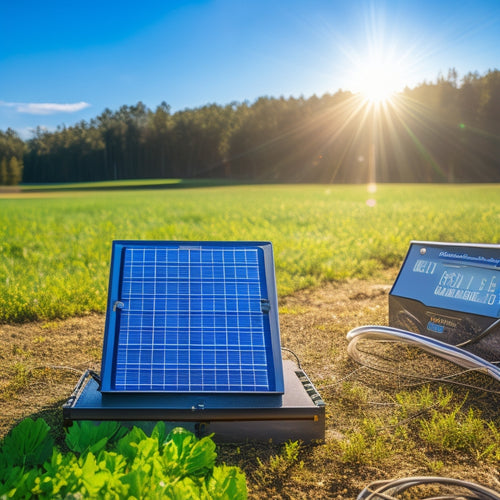
Cost of Solar Battery Backup System
Share
You can expect to invest between $10,000 and $30,000 or more for a solar battery backup system, depending on the size, capacity, and brand of the system, as well as the installation costs and local incentives. This significant upfront cost is offset by the long-term benefits, including a reduced carbon footprint, energy independence, and lower utility bills. Your specific needs, such as prioritizing essential appliances and evaluating your energy consumption patterns, will also influence the overall cost. By understanding the components and factors that impact the cost of a solar battery backup system, you'll be better equipped to make an informed decision that meets your unique requirements.
The Essentials
- The cost of a solar battery backup system varies depending on the type and quality of components, installation, and location.
- A typical solar battery system can cost between $10,000 and $20,000, with prices decreasing as technology advances.
- The cost of a solar battery system is offset by potential savings on utility bills, tax credits, and rebates for solar investments.
- High-quality battery technology, such as lithium-ion, can increase the upfront cost but provides longer lifespan and higher efficiency.
- Assessing energy needs and prioritizing essential appliances can help optimize system design and reduce overall cost.
Reliable Power During Outages
When the grid goes down, you'll want a solar battery backup system that provides power without interruption.
With a reliable system, you'll experience a seamless energy shift, ensuring your essential appliances and devices stay operational.
By investing in a high-quality solar battery backup system, you'll have peace of mind knowing you're prepared for the next outage.
Additionally, a solar power backup system can reduce your reliance on noisy, polluting generators and the hassle of refueling them, providing a more convenient and environmentally friendly solution.
Power Without Interruption
Because the grid can be unpredictable, a solar battery backup system guarantees you have reliable power during outages, allowing you to continue daily activities without interruption. This means you'll maintain power quality, even when the grid fails.
With a solar battery backup system, you'll enjoy energy resilience, ensuring your home remains powered during utility outages. Furthermore, you'll protect sensitive electronics from damaging power surges and data loss, Home Energy Storage and keep essential devices, including life-saving medical equipment and communication systems, powered and operational.
You'll no longer worry about spoiling food, disrupted communication, or compromised safety. Your lights, refrigeration, and critical appliances will continue to function, providing you with the freedom to live life as usual.
In addition, a solar battery backup system enables you to prioritize your energy needs, allocating power to essential devices and appliances during an outage.
Seamless Energy Transition
A seamless energy shift is critical during power outages, and a solar battery backup system guarantees that you experience just that - uninterrupted power flow. This is especially important for homes and businesses that rely on continuous power supply.
With a solar battery backup system, you can rest assured that your appliances and devices will keep running smoothly, even when the grid goes down. By integrating a battery storage system into your solar setup, you'll release the full potential of renewable energy and create a more sustainable, dependable, and cost-effective power solution Energy Storage Solutions.
This is made possible through grid integration, which allows the system to synchronize with the grid's frequency and voltage, ensuring a stable and reliable power supply. During an outage, the system automatically switches to battery power, providing you with a reliable source of energy.
This means you can continue to power your essential appliances, such as refrigeration, lighting, and communication devices, without interruption. With a solar battery backup system, you'll enjoy uninterrupted power flow, giving you the freedom to live and work without worrying about power outages.
Low Carbon Footprint Guaranteed
You'll reduce your energy dependence on the grid with a solar battery backup system, which means you'll be generating your own clean energy.
As a renewable energy source, solar power greatly lowers your carbon footprint, contributing less to climate change and air pollution.
By incorporating a solar energy storage system into your setup, you can store excess energy generated during the day for use during the night or in the event of an outage.
With a solar battery backup system, you'll be producing and storing your own clean energy, further reducing your reliance on fossil fuels.
Reduced Energy Dependence
With a solar battery backup system, your energy dependence on the grid markedly decreases, allowing you to power your home with clean energy and reduce your carbon footprint.
This reduced energy dependence translates to significant energy savings, which in turn lower your utility bills. The battery installation provides a reliable backup capacity, ensuring that you have power during grid outages or peak usage periods.
The system's efficiency is additionally enhanced by its ability to optimize energy storage and release, maximizing your energy independence.
As you become less reliant on the grid, you'll experience a substantial reduction in your environmental impact.
Moreover, you may be eligible for financial incentives, such as tax credits or rebates, for investing in a solar battery backup system.
With minimal maintenance costs and continuous technology advancements, your system will remain efficient and effective for years to come.
Renewable Energy Source
The solar battery backup system employs the power of renewable energy, guaranteeing a low carbon footprint for your home. By capturing the energy of the sun, you're reducing your reliance on fossil fuels and minimizing your environmental impact.
As a result, you'll enjoy a cleaner, healthier living space that's better for you and the planet.
As you shift to renewable energy, you'll also benefit from various solar incentives and energy policies designed to encourage sustainable living. Governments and organizations offer financial incentives, such as tax credits and rebates, to individuals and businesses adopting solar energy solutions.
Additionally, many utility companies offer net metering programs, allowing you to sell excess energy back to the grid and offset your consumption.
Deep Cycle Battery Technology
When selecting a deep cycle battery for your solar battery backup system, you'll want to take into account two key factors: battery cycle life and advanced battery materials.
To maximize renewable energy storage and reduce reliance on the grid, it's crucial to choose a battery that can handle repeated deep discharging high-performance batteries.
A battery's cycle life refers to the number of charge and discharge cycles it can handle before its capacity starts to degrade.
Look for batteries with high-quality materials that can withstand repeated deep discharging, as they'll provide a longer lifespan and more reliable performance.
Battery Cycle Life
As you investigate the world of solar battery backup systems, you'll want to understand the significance of battery cycle life.
Battery cycle life refers to the number of charge and discharge cycles a battery can handle before its capacity starts to degrade. A longer battery cycle life means your solar battery backup system will remain efficient and effective over a longer period.
To optimize battery cycle life, proper battery maintenance is essential. This includes ensuring the battery is operated within the recommended temperature range, keeping it clean and dry, and avoiding deep discharging.
Regular performance monitoring and optimization can also help extend battery cycle life. By keeping your battery in top condition, you can maximize its lifespan and minimize the need for premature replacements.
When selecting a solar battery backup system, look for manufacturers that provide detailed information on battery cycle life and maintenance requirements.
A reputable manufacturer will provide a clear warranty and performance guarantee, giving you peace of mind and protection for your investment.
Advanced Battery Materials
Frequently, advancements in battery technology have led to significant improvements in solar battery backup systems. As you investigate the options for your solar battery backup system, you'll likely come across advanced battery materials that promise enhanced performance and efficiency.
Deep cycle battery technology, in particular, has seen significant advancements in recent years.
You'll benefit from battery chemistry innovations that enable deeper discharging, longer lifetimes, and improved overall efficiency. For instance, lithium-ion batteries have become increasingly popular due to their high energy density, long cycle life, and relatively low self-discharge rates.
Other advancements in energy storage technologies have led to the development of more efficient and cost-effective battery management systems. These innovations allow you to store excess energy generated by your solar panels during the day and use it when you need it, giving you greater control over your energy usage and costs.
Assess Your Energy Demands
You need to determine your daily energy consumption to accurately size your solar battery backup system. This involves identifying the vital appliances you want to power during an outage and prioritizing them based on their significance.
Daily Energy Consumption
About 30 kilowatt-hours (kWh) of electricity are consumed daily in an average American home, making it essential to assess your energy demands accurately.
To get a clear representation of your daily energy consumption, you'll need to analyze your energy usage patterns. This involves tracking your consumption over time to identify peak hours, seasonal variations, and areas where you can implement efficiency measures.
You can start by reviewing your past utility bills to understand your energy usage. Look for patterns and anomalies to identify opportunities for lifestyle changes. For instance, you might notice that your energy consumption increases during summer months due to air conditioning. You can then investigate ways to reduce your energy usage during this period, such as upgrading to energy-efficient appliances or adjusting your thermostat.
Conducting an energy audit will also help you identify areas of inefficiency in your home. This will enable you to prioritize budget considerations and make informed decisions about your energy usage.
Essential Appliance Priorities
Understanding your daily energy consumption sets the stage for evaluating your energy demands, particularly when it comes to prioritizing essential appliances in your solar battery backup system.
Now, it's vital to identify the appliances you can't live without during an outage. You'll need to take into account the energy efficiency of each appliance and prioritize them accordingly.
You should categorize your appliances into must-haves, nice-to-haves, and luxuries. Must-haves include refrigeration, lighting, and medical equipment. Nice-to-haves might include computers, televisions, and kitchen appliances. Luxuries can include pool pumps, hot tubs, and electric vehicles.
When selecting appliances for your backup system, focus on energy-efficient models that minimize energy consumption. This will help you maximize the capacity of your solar battery backup system.
Longer Lifespan Than Generators
When you're preparing for an extended power outage, a solar battery backup system can provide a reliable source of energy for a longer period than traditional generators.
This is because solar batteries are designed to last for thousands of cycles, whereas generators typically have a shorter lifespan due to their mechanical components.
Extended Power Outage
As you weigh the pros and cons of investing in a solar battery backup system, consider the peace of mind that comes with having a reliable power source during extended outages.
With an average lifespan of 10-15 years, solar batteries outlast traditional generators, providing extended power outage protection for your home or business.
In the event of a prolonged grid failure, a solar battery backup system guarantees you remain connected, comfortable, and productive.
This is particularly vital for households with critical medical equipment, refrigeration, or communication needs.
By investing in a solar battery backup system, you're taking a proactive approach to outage preparedness and energy resilience.
Unlike generators, which are noisy, polluting, and require frequent maintenance, solar batteries operate silently and efficiently, providing a seamless shift to backup power when the grid fails.
With a solar battery backup system, you'll enjoy uninterrupted access to essential appliances, lighting, and communication devices, even during extended power outages.
Frequently Asked Questions
Can I Use My Existing Solar Panels With a Battery Backup System?
You can likely use your existing solar panels with a battery backup system, but first, verify battery compatibility and seamless solar panel integration by checking your panel specs and consulting with a professional to confirm a smooth changeover.
How Long Does It Take to Install a Solar Battery Backup System?
Like a conductor leading an orchestra, you're orchestrating your energy independence. The installation timeline depends on the complexity of the job, but typically, the installation process takes 1-3 days for a standard solar battery backup system.
Are Solar Battery Backup Systems Eligible for Government Incentives?
You'll be pleased to know that solar battery backup systems are eligible for government incentives, such as tax credits, which can greatly reduce the upfront cost.
Can I Monitor My Solar Battery Backup System Remotely?
You're the captain of your energy ship, steering towards independence. With remote monitoring, you can keep a pulse on your solar performance, tracking production and storage in real-time, making adjustments on-the-fly to optimize your system's performance from anywhere.
What Maintenance Is Required for a Solar Battery Backup System?
You'll need to perform regular maintenance to verify your solar battery backup system runs efficiently, including checking voltage, cleaning terminals, and monitoring temperature to maximize battery lifespan; follow these maintenance tips to confirm ideal performance.
Final Thoughts
As you evaluate the cost of a solar battery backup system, remember that reliability and sustainability are priceless. Like a lighthouse in the dark, a solar battery backup system shines bright during outages, illuminating your path to energy independence. With a lifespan that far outshines traditional generators, it's a wise investment for those who crave freedom from the grid. By appraising your energy demands and utilizing the power of deep cycle battery technology, you'll be well on your way to a carbon-neutral future.
Related Posts
-

Is This the Future of Alternative Energy Systems
Yes, alternative energy systems are shaping the future of energy. Innovations in solar and wind technologies are driv...
-

Designing a Green Roof for Maximum Energy Efficiency
Designing a green roof for maximum energy efficiency involves several key strategies. Start by selecting native, drou...
-

Choosing the Right Solar Power Charge Controller
Choosing the right solar power charge controller is crucial for maximizing energy efficiency and extending battery li...


